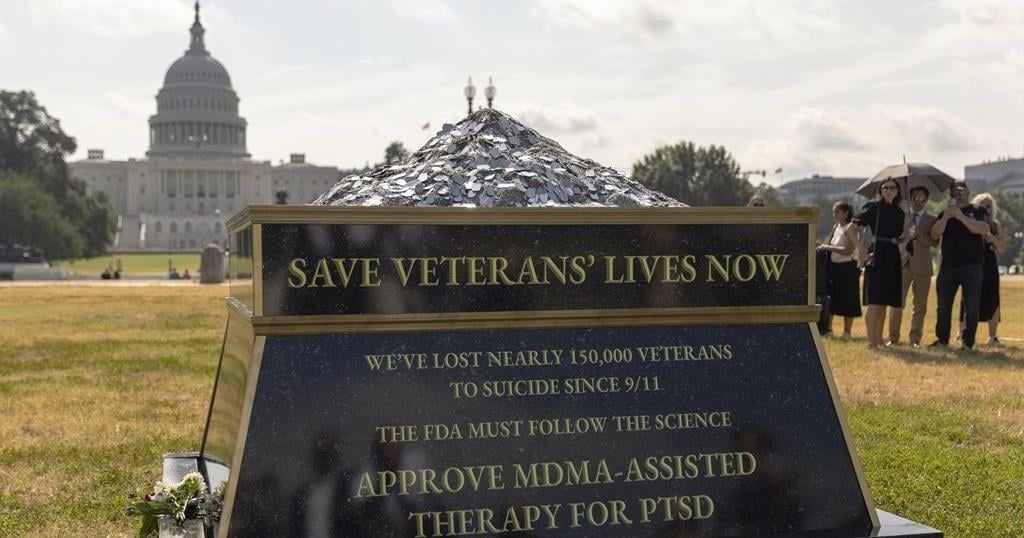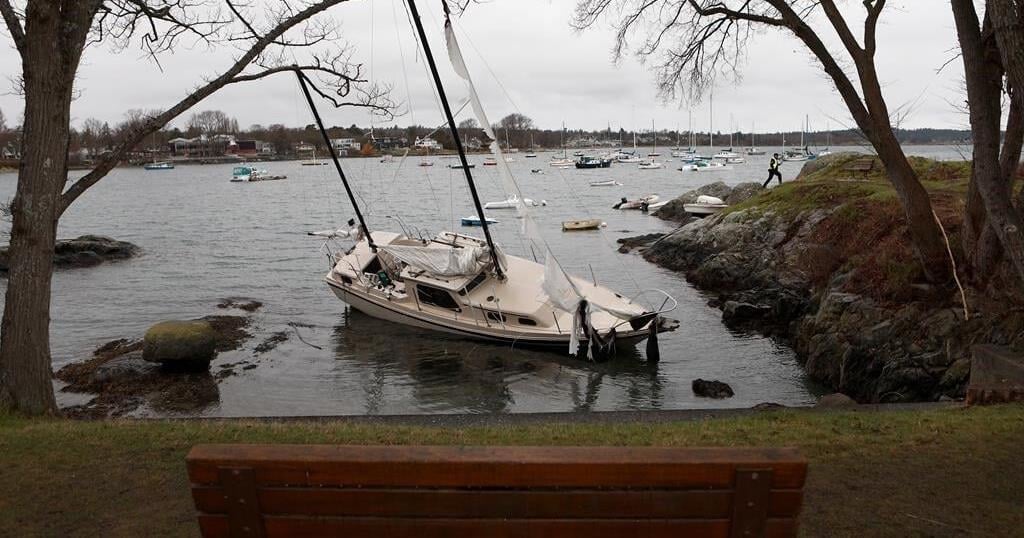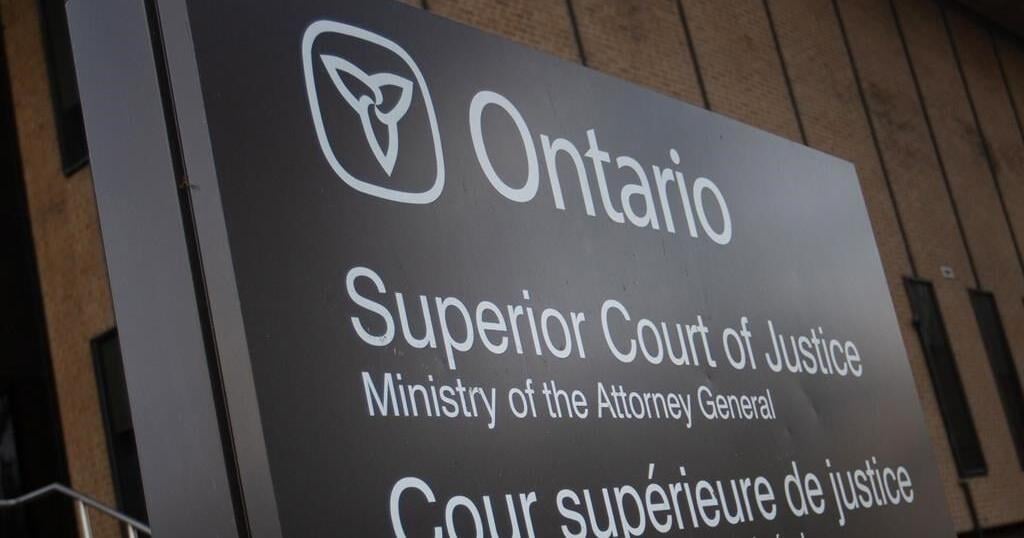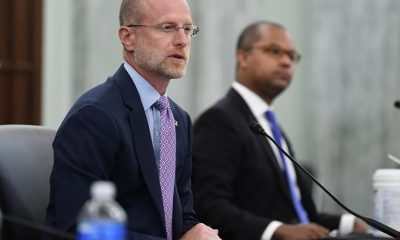NEW YORK (AP) — It was a landmark moment for the psychedelic movement: The Department of Veteran Affairs’ top doctor stood on stage, praising advocates who have spent decades promoting the healing potential of mind-altering drugs.
In an unannounced appearance at a New York psychedelic conference, the VA’s Dr. Shereef Elnahal said his agency was ready to start rolling out MDMA-assisted therapy for post-traumatic stress disorder as soon as regulators approved it.
“The VA has to be first, as we have been, with the mental health needs of our veterans,” Elnahal told attendees at the May meeting. He also highlighted the “awesome, groundbreaking” research on the drug by MAPS, or the Multidisciplinary Association for Psychedelic Studies, the leading nonprofit advocating for the medical and legal use of hallucinogenic drugs.
But expectations for MDMA’s first-of-a-kind approval quickly unraveled a few weeks later when Food and Drug Administration advisers voted overwhelmingly against the drug, citing flawed data, questionable research conduct, and potential safety and addiction risks. The panel’s recommendation isn’t binding, but the FDA is widely expected to delay or decline approval when it makes its decision by mid-August.
The potential rejection has sent shockwaves through the psychedelic community, including combat veterans who have spent years lobbying for the drug, which is also known as ecstasy or molly. The advocacy effort has long been intertwined with MAPS, which has funded or supported some of the most vocal veterans supporting psychedelic therapy.
Dr. Harold Kudler of Duke University met with veterans and MAPS leaders while serving as the VA’s top consultant on mental health services. He believes FDA’s experts are justifiably skeptical of the science behind the drug, which he says has been drowned out by messaging from MAPS and its leader, Rick Doblin, who began pursuing MDMA’s approval in the mid-1980s.
“Rick is the most persuasive advocate within the scientific community that I’ve ever seen. You want to believe him because he’s offering you something you sorely need — an effective treatment for PTSD,” Kudler said. “But I think the FDA committee caught a glimpse of how much of this is Rick’s zeal and how much is real.”
MAPS declined to make Doblin available for an interview. Instead the group pointed to a recent statement by two dozen scientists and pharmaceutical executives — many with backgrounds in psychedelic research — supporting MDMA’s approval.
Earlier this year, MAPS changed the name of its drug development arm to Lykos Therapeutics, allowing the new company to raise funds from outside investors.
In addition to shortcomings in Lykos’ studies, FDA panelists voiced concern about separate allegations that some MAPS-affiliated researchers suppressed negative study results or coached patients to inflate positive results. The FDA says it’s investigating those claims.
Casey Tylek, an Army veteran, says he didn’t experience any of that while participating in the study. When he asked researchers for guidance in evaluating the effect of the drug, Tylek says he was repeatedly rebuffed and told he had to rate the treatment without any outside influence.
Tylek says he was “pessimistic” going into the trial, but credits MDMA-assisted therapy with resolving anger, anxiety and trauma stemming from a rocket attack in Iraq.
“It basically rewrote that memory in my mind and how it functioned,” Tylek said. “I was able to just kind of let go of it and not be hung up on it.”
Kudler and other researchers say they want to see the MDMA results confirmed in larger studies that have no links to the psychedelic community.
That work would take years. Veterans who support the treatment say it would jeopardize patients suffering from PTSD who haven’t been helped by antidepressants and other existing therapies. The suicide rate among veterans is 70% higher than the general population, according to government figures, with 18 veteran suicides per day in 2021.
Jon Lubecky, who served in both the Marines and the Army, says he tried to kill himself five times after returning from deployment to Iraq in 2006. After years of struggling with PTSD he enrolled in a MAPS trial in 2014. He credits MDMA-assisted therapy with curing his condition.
Since then, Lubecky has told his story hundreds of times in media interviews, congressional hearings and private meetings with military officials and federal lawmakers, including conservatives like Sen. Rand Paul and Rep. Dan Crenshaw.
Lubecky worked as a consultant for MAPS for more than five years. But he rejects the idea that he was merely advancing the agenda of psychedelic boosters who want to see the drugs outright legalized.
“I’m not in this for ending the drug war or any of those other things,” he said. “I’m in it for my friends.”
Lubecky’s work helped secure $20 million in funding for the VA to conduct its own studies of psychedelics, including MDMA and ketamine.
Part of the rationale for that research: Many veterans now leave the U.S. to undergo psychedelic therapy at clinics in Mexico, Peru and other countries where it is more accessible.
A nonprofit group, Heroic Hearts Project, currently has a waiting list of over 1,000 veterans seeking financial and logistical support to travel abroad. A former Army Ranger, Jesse Gould, founded the group after returning from a weeklong retreat in Peru using ayahuasca, the psychedelic brew associated with indigenous cultures of the Amazon. After the experience, he said he was able to overcome anxiety, anger and depression that had burdened him after three deployments to Afghanistan.
Gould says MAPS deserves credit for kickstarting research that could eventually help thousands of veterans.
“I think MAPS has done more for the veteran community in this area than most politicians have done in the last 20 years,” said Gould, whose group has no financial ties to MAPS. “Time and time again our needs either go unheard or go to the back of the line.”
Heroic Hearts hosted an event on Capitol Hill earlier this month where several House lawmakers and veterans called for MDMA’s approval.
Gould doesn’t expect the FDA to flatly reject MDMA. Instead he and others say the agency may ask Lykos to perform additional studies.
Even if the company is unable to quickly conduct that research, experts say others could benefit by avoiding the pitfalls in Lykos’ MDMA application, including a small patient population with little diversity and a high potential for bias.
Dozens of other drugmakers are studying psilocybin, LSD and other psychedelics for depression, anxiety and addiction.
Dr. John Krystal, a Yale University psychiatry professor, said Lykos’ setback “will hopefully ensure that future studies are conducted in ways that give reviewers greater confidence about the effectiveness and the safety of these drugs.”
___
The Associated Press Health and Science Department receives support from the Howard Hughes Medical Institute’s Science and Educational Media Group. The AP is solely responsible for all content.

























